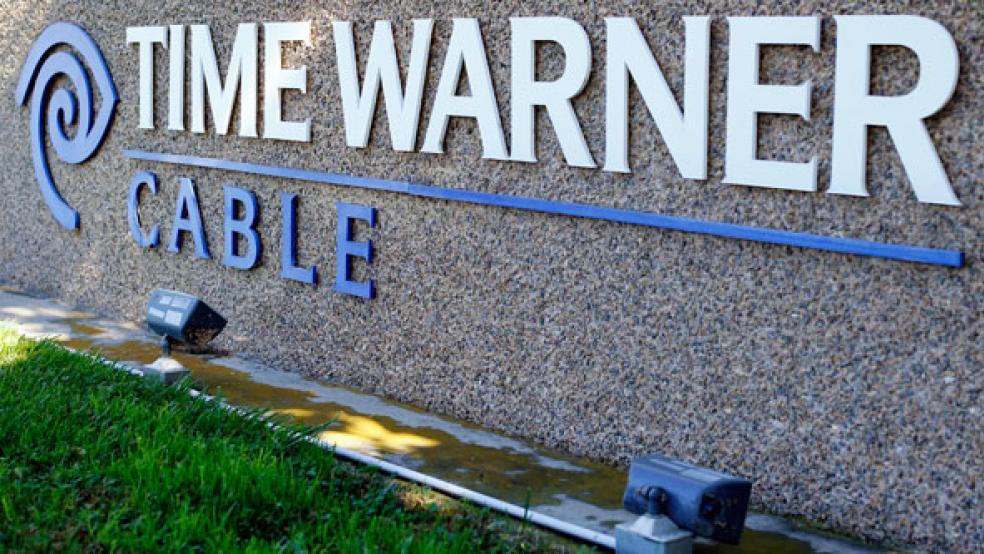Cable giant Time Warner and broadcasting behemoth CBS have been feuding for months, in an increasingly public spat over how much Time Warner Cable should pay to re-broadcast CBS network TV. On Friday, the fight went nuclear, with Time Warner pulling the plug, leaving millions of customers (including whole swaths of Los Angeles, Dallas, and New York) without access to CBS and its various cable channels, notably Showtime.
"Not since Godzilla faced off against Mothra has a battle wreaked such ugly consequences on innocent bystanders," says Lloyd Grove at The Daily Beast. The two giant corporations "are fighting over filthy lucre," but the Orwellian propaganda war is worse, with each side "straining to convince millions of blameless citizens, i.e. the ones getting screwed out of the shows they watch, that it's the other guy's fault."
RELATED: BATTLE OF THE NETWORK STARS: WHY LES IS MORE AT CBS
The two sides won't disclose exactly how much money they are fighting over. Time Warner Cable is publicly accusing CBS of seeking a 600 percent increase in retransmission fees in major markets. A more believable number, from several published reports, is that CBS wants $2 per customer for CBS network TV, a 100 percent increase. It's also about $3 per customer less than what TWC pays ESPN.
Time Warner Cable argues that CBS is making "outrageous demands" that will prompt other broadcasters to demand higher fees, too, jacking up your already rising cable bill. CBSmaintains that it is only seeking "fair compensation for the most-watched television network with the most popular content in the world." As the blackout entered its fourth day on Monday, the two camps say they aren't even talking.
Media analysts tell The New York Times' Bill Carter that the standoff could last anywhere from 10 days to as long as six weeks, when the NFL season starts and the blackout becomes untenable. And the general consensus seems to be that CBS has the upper hand.
Time Warner is "waging this message war at a significant disadvantage," says The Daily Beast's Grove.
The public interacts with CBS — greedy though it might be, and possibly taking its cue from the People's Republic of China when it comes to blocking internet access — as a free provider of popular entertainment, sports and news programming. What could be bad? On the other hand, customers of TWC (and other cable distributors) frequently experience malfunctioning equipment, long waits on the phone, unresponsive or rude service representatives, and ever-inflating monthly charges. [Daily Beast]
Besides, the $2 CBS is asking for isn't unreasonable, RBC Capital Markets analyst David Bank tells The New York Times. "I would argue they are almost a bargain," since CBS spends more than $4 billion a year on programming. Time Warner says that CBS, as a broadcaster, has access to the public airwaves — it even encourages customers to use antennas to watch CBS — but that's "almost irrelevant" to customers, Bank says. "Nobody watches television that way anymore." That's why this fight is "not going so great for" Time Warner.
It's not going great for customers, either, says David Carr at The New York Times. So "here's an idea for both parties: Leave us out of it." It's not like either company is struggling — CBSbooked $3.65 billion in profit over the past 12 months, while TWC raked in $7.65 billion in the same period.
We know that you are fighting over lucre, not our inalienable rights as cable consumers. Pretending that you are fighting on our behalf rather than in the interests of your shareholders and executives is infantilizing and unbecoming. CBS is coming off another record year, Time Warner Cable's stock is storming along, and the fight over retransmission fees is about how the pie is sliced, nothing more. [New York Times]
If CBS and Time Waner want to "continue to bash in each other's heads," that's their business,Carr adds. "Just don't pretend this is a noble crusade for the consumer." On Twitter, he's more direct:
My bit: Watching TWCable vs. CBS is like Rodan vs. Godzilla. You want they both to fly off the cliff. http://t.co/j1LnZvzLNc— david carr (@carr2n) August 5, 2013
Time Warner's suggestion that we use an antenna is comically useless, says Alessandra Stanley in The New York Times. But it's other suggestion — that we sign up for Aereo — is "suicidal." For $8 a month, Aereo users can watch "watch broadcast network shows at any time, live, with an option to record for later viewing." It is, in other words, one more bit of proof that we don't need to subscribe to Time Warner Cable.
"That's when I realized that like spouses in the middle of an ugly separation, both sides are completely insane.... CBS and other networks have gone to court to block companies like Aereo from showing their programs. Cable companies are required to pay a retransmission fee to the networks in order to present network programming. Aereo, on the other hand, argues that television is free via the airwaves, and pays nothing....
Mutually assured destruction is a deterrent that only works when there are two superpowers with the same nuclear capability. The battle between broadcast networks and cable providers is more like a toxic custody battle: If it is bad enough, neither parent wins, and children grow up too fast and go their own way. Soon, everyone may be calling Aereo Mommy, and Netflix Daddy." [New York Times]
This article originally appeared at TheWeek.com. Read more from TheWeek.com:
Why Students Are Rejecting America's Top Colleges
The Problem With TIME's Cover Story on the Child-Free Life
Parents Reflect on Their Biggest Money Regrets




